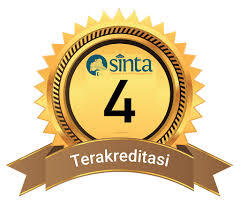Islamic Schools As A Means Of Millenial Generation’s Education
 Abstract views: 432
,
Abstract views: 432
,
 PDF downloads: 151
PDF downloads: 151
Abstract
Islamic schools are expected to be a means to achieve the goals of Islamic education. Therefore, they should not focus on religion field only, but they should be balanced by science. It is because of the goals of Islamic education guide us to achieve the happiness of the world and here after. So that, Islamic schools should be able to facilitate millennial generation by Islamic religion and science in order to produce the graduates who are knowledgeable and having good character. In addition, they are also expected to produce the competitive graduates. Therefore, this paper will discuss about the goals of Islamic education, and how the Islamic schools, focusing on madrasah should design their curriculum for millennial generation to achieve the goals of Islamic education. Correlating of this statement, Curriculum for MI and MTS should focus on transferring knowledge and forming character, whereas, curriculum for MA should focus on life skill training besides both of those competencies. Nevertheless, the implementation of curriculum will be achieved maximal when it is supported by headmaster who will be able to manage their human resources. So that, madrasah will be a means of millennial generation’s education.
Keyword: Islamic education, Islamic schools, millennial generation, Islamic schools for millennial generation
Downloads
References
Al-Syaibany, Omar Mohammad al-Toumy. 1979. Falsafah Pendidikan Islam, terj. Hasan Langgulung. Jakarta: Bulan Bintang.
Syaikh, Abdullah bin Muhammad Alu. 2008. Tafsir Ibnu Katsir, terj. M. Abdul Ghoffar & Abu Ihsan al-Atsari, jilid 7. Jakarta: Pustaka Imam Asy-Syafi’I.
Arifin, M. 2014. Ilmu Pendidikan Islam, Tinjauan Teoretis dan Praktis berdasarkan Pendekatan Interdisipliner, cet. 6. Jakarta: Bumi Aksara.
Arifin, Muzayyin. 2011. Kapita Selekta Pendidikan islam. Jakarta: Bumi Aksara.
______________. 2012. Filsafat Pendidikan Islam. Jakarta: Bumi Aksara.
Azra, Azyumardi. 2012. Pendidikan Islam: Tradisi dan Modernisasi di Tengah Tantangan Milenium III. Jakarta: Kencana Prenadaminia Group
Daradjat, Zakiah. 2014. Ilmu Pendidikan Islam. Jakarta: Bumi Aksara.
Daulay, Haidar Putra. 2012. Pendidikan Islam dalam Sistem Pendidikan Nasional di Indonesia. Jakarta: Kencana.
Masruroh, Ninik, Umiarso. 2011. Modernisasi Pendidikan ala Azyumardi Azra. Jogjakarta: Ar-Ruzz Media.
Muhaimin. 2012. Pemikiran dan Aktualisasi Pengembangan Pendidikan Islam. Jakarta: Rajawali Pers
________. 2012. Pengembangan Kurikulum Pendidikan Agama Islam di Sekolah, Madrasah, dan Perguruan Tinggi. Jakarta: Rajawali Pers.
Nata, Abuddin. 2014. Sejarah Pendidikan Islam. Jakarta: Kencana Pranademinia Group.
Nizar, Samsul. 2011. Sejarah Pendidikan Islam. Jakarta: Kencana Prenada Media Group.
Tafsir, Ahmad Tafsir. 2011. Ilmu Pendidikan dalam Perspektif Islam, cet. 10. Bandung: PT Remaja Rosdakarya.
Yasin, Ahmad Fatah. 2011. Pengembangan Sumber Daya Manusia di Lembaga Pendidikan Islam. Malang: UIN-Maliki Press.
Putra, Yanuar Surya. 2016. Theoritical Review: Teori Perbedaan Generasi. Among Makarti. 19(18): 123-134.
Wahana, Haeru Dwi. 2015. Pengaruh Nilai-Nilai Budaya Generasi Millenial dan Budaya Sekolah terhadap Ketahanan Individu (Studi di SMA Negeri 39, Cijantung, Jakarta). Ketahanan Nasional. 21(1): 14-22.
Wahyuni, Fitri. 2015. Kurikulum dari Masa ke Masa; Telaah atas Pentahapan Kurikulum di Indonesia. Al-Adabiya, 10(2): 239.
Copyright (c) 2019 TADRIS: Jurnal Pendidikan Islam

This work is licensed under a Creative Commons Attribution-NonCommercial 4.0 International License.
The journal operates an Open Access policy under a Creative Commons Non-Commercial 4.0 International license. Authors who publish with this journal agree to the following terms:
- Authors retain copyright and grant the journal right of first publication with the work simultaneously licensed under a
 Commons Attribution-NonCommercial 4.0 International License
Commons Attribution-NonCommercial 4.0 International Licensethat allows others to share — copy and redistribute the material in any medium or format, and adapt — remix, transform, and build upon the material.
- Authors are able to enter into separate, additional contractual arrangements for the non-exclusive distribution of the journal's published version of the work (e.g., post it to an institutional repository or publish it in a book), with an acknowledgement of its initial publication in this journal.
- Authors are permitted and encouraged to post their work online (e.g., in institutional repositories or on their website) prior to and during the submission process, as it can lead to productive exchanges, as well as earlier and greater citation of published work (see The Effect of Open Access).














